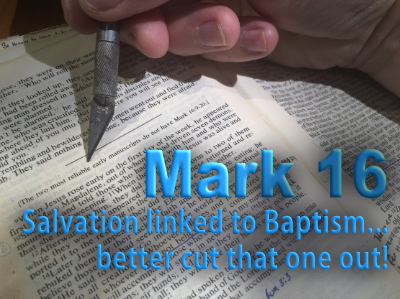
I love the Gospel of Mark. It is penned by John Mark who was the cousin of Barnabas and a sometimes traveling companion of the Apostle Paul. Historians speculate that John Mark was probably more associated with Peter than Paul and as a young man, would have been very close to him back in Jerusalem. For this reason, most of the information in the Gospel of Mark is probably gleaned from the stories Peter told.
Three Important Claims
As Mark’s Gospel closes out in chapter 16, there are some statements made which two different religious movements claim as important proof texts for their doctrines. The Charismatic Movement points to the disciples being told they will be able to do miracles and the pro-baptism groups point to Jesus comments about baptism.
Both groups bump into a road block when they turn to these scriptures because scholars do not believe this portion of Mark was ever in the original texts. They believe it was added later. Using this claim, their detractors dismiss any doctrinal conclusions which may spring from this neighborhood by diminishing the validity of this section of scripture. Take a look at your Bible and notice that Mark 16:9-20 has a seemingly ominous warning… “The two most reliable early manuscripts do not contain Mark 16:9-20.”
If we are having a discussion about the miraculous gifts of the Spirit or water baptism and someone wants question the authenticity of this passage of scripture, there is really no point in using it in the debate. In fact, it is probably better to just drop it and move on. So, that’s what we are going to do here at A Faith that Obeys. Let’s not add this particular scripture to our growing collection of scriptures which demonstrate the Biblical requirement of baptism for the forgiveness of sins, the gift of the Holy Spirit and the gift of e ternal life.
We will not use it!
But, you really should at least be familiar with the arguments… so let’s dive in.
Click here to read the rest of this post.